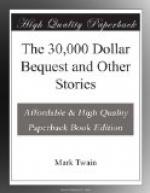for a few days, but she has found me out. Found
me out, and has named the place Tonawanda —says
it
looks like that. In fact I was not sorry
she came, for there are but meager pickings here,
and she brought some of those apples. I was
obliged to eat them, I was so hungry. It was
against my principles, but I find that principles have
no real force except when one is well fed. . . .
She came curtained in boughs and bunches of leaves,
and when I asked her what she meant by such nonsense,
and snatched them away and threw them down, she tittered
and blushed. I had never seen a person titter
and blush before, and to me it seemed unbecoming and
idiotic. She said I would soon know how it was
myself. This was correct. Hungry as I was,
I laid down the apple half-eaten—certainly
the best one I ever saw, considering the lateness
of the season —and arrayed myself in the
discarded boughs and branches, and then spoke to her
with some severity and ordered her to go and get some
more and not make a spectacle or herself. She
did it, and after this we crept down to where the
wild-beast battle had been, and collected some skins,
and I made her patch together a couple of suits proper
for public occasions. They are uncomfortable,
it is true, but stylish, and that is the main point
about clothes. . . . I find she is a good deal
of a companion. I see I should be lonesome and
depressed without her, now that I have lost my property.
Another thing, she says it is ordered that we work
for our living hereafter. She will be useful.
I will superintend.
Ten days later.—She accuses
me of being the cause of our disaster! She
says, with apparent sincerity and truth, that the Serpent
assured her that the forbidden fruit was not apples,
it was chestnuts. I said I was innocent, then,
for I had not eaten any chestnuts. She said the
Serpent informed her that “chestnut” was
a figurative term meaning an aged and moldy joke.
I turned pale at that, for I have made many jokes
to pass the weary time, and some of them could have
been of that sort, though I had honestly supposed
that they were new when I made them. She asked
me if I had made one just at the time of the catastrophe.
I was obliged to admit that I had made one to myself,
though not aloud. It was this. I was thinking
about the Falls, and I said to myself, “How wonderful
it is to see that vast body of water tumble down there!”
Then in an instant a bright thought flashed into my
head, and I let it fly, saying, “It would be
a deal more wonderful to see it tumble up there!”—and
I was just about to kill myself with laughing at it
when all nature broke loose in war and death and I
had to flee for my life. “There,”
she said, with triumph, “that is just it; the
Serpent mentioned that very jest, and called it the
First Chestnut, and said it was coeval with the creation.”
Alas, I am indeed to blame. Would that I were
not witty; oh, that I had never had that radiant thought!




